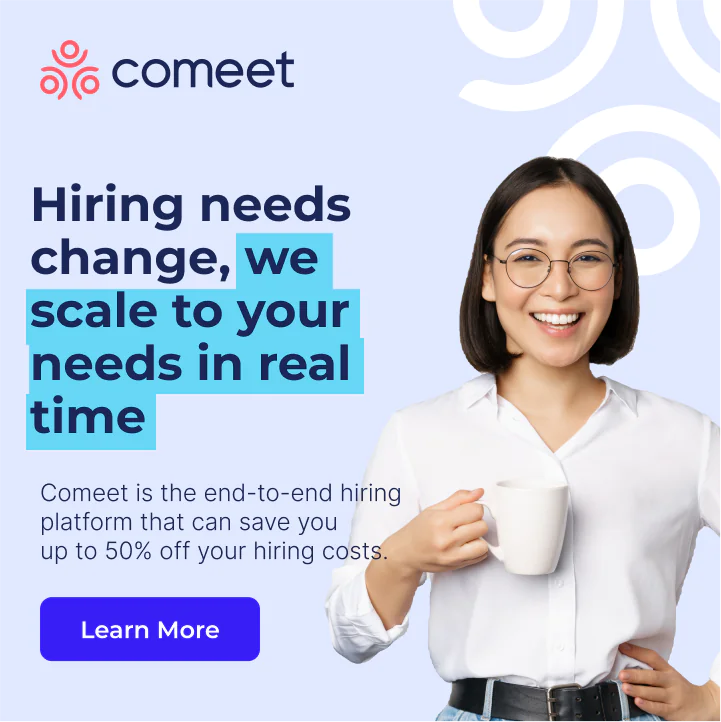Keeping your company fully-staffed with the best talent is an ongoing process. Even if most of your hiring needs are met, changes will come and you need to be prepared to do it all over again. That’s where a recruitment process outsourcing (RPO) team can help. This hiring option is growing in popularity and isn’t limited to bigger companies. Here’s how to know if your business is a good fit for an RPO and what you can do to ensure you make the right choice.
What is recruitment process outsourcing?
Recruitment process outsourcing (RPO) involves working with an outside firm for your recruiting and hiring tasks. When a company selects an RPO provider, they are looking for a long-term relationship to help with every part of talent acquisition, including creating job postings, fine-tuning the candidate experience, and hiring.
RPO partnerships are designed to be ongoing, which allows the team to really get to know your internal hiring needs and work with you on each step in the recruiting process. This allows you to maintain your brand identity and culture while gaining access to industry expertise.
Do you need an RPO?
It’s common for employees to change jobs and even careers many times over the course of their lifetime, so you can no longer take even your most stable workers for granted. It’s safe to assume you will always need to hire and that talent gaps will exist.
To stay competitive in the market, it pays to be proactive in hiring and anticipate vacancies. If you like the idea of realizing cost savings by finding the most high-quality candidates each time, teaming up with an RPO provider may be the way to go.
What type of business needs an RPO partner?
Your business may be a good fit for an RPO firm if you’re in a highly-specialized industry where it’s difficult to attract or retain top talent. Or, you may find good hires, but you have trouble sourcing the best hires.
RPO are also suitable for businesses that expect to achieve rapid growth and will need people in seats right away but don’t want to sacrifice brand identity or culture by completely outsourcing to a staffing agency.
RPO services are designed to help larger companies get a handle on hiring. It’s not ideal for a small startup or those with just one or two new positions or openings each year. The process becomes more cost effective over the course of hiring tens, hundreds, and even thousands of employees in a year.
The characteristics of a good RPO
With so many RPOs out there, how can you know who’s legitimate? At a minimum, a reliable RPO should do the following:
- Deliver the right people for the job in record time: If they can’t demonstrate an ability to get talented employees who stick around, they aren’t worth the expense.
- Know your field: They should go beyond just telling you how they can hire. They should tell you how to hire in your specific industry. From certification and training to skill set needed for the role, look for RPOs to share their expertise in your market.
- Customize: A one-size-fits-all strategy to hiring is a big red flag that an RPO won’t work to meet your unique needs and specifications. Much of the onboarding for an RPO solution is getting to know you and your employer branding. If this isn’t implied, consider going elsewhere.
- Be global: If you have locations across the state—or the world—your RPO partner should be able to do just as well with the hiring. Knowing locale-specific hiring regulations, cultural preferences, and labor markets is key. Partnering with the right RPO can help you hire in any environment.
Tips to know when choosing a great RPO
How can you find a high-quality team that can do all of the above? Start by doing your homework. Before you pick a partner, consider following these 5 steps.
1. Know the process
How do you currently hire? If you don’t have a documented process, create one now. In order to integrate the RPO quickly, you’ll need to be able to tell them what you currently do, even if it’s not your ideal hiring process. Be sure to include any compliance or legal hoops you already deal with.
2. Know the “why”
What are you hoping to get out of your RPO partnership? In addition to getting hires, are there process improvements or data metrics you want to realize? What budgetary goals will this arrangement meet? Be honest about your desires and your expectations for the RPO company.
3. Get your questions down
Before you ever meet with the RPO team, create a list of questions you want to ask. Include your HR department, hiring managers, and any other key stakeholders in the brainstorming session so that you don’t leave out any important pieces of the puzzle. Also, think about your wants and rank them in order of importance.
4. Devise a plan
After meeting with the RPO, know what the way forward will look like. Then, give it time to work. Don’t be impatient with the process, and understand that it will take time to watch it all come together. Giving up on the strategy too soon is a leading cause of failure with RPO partnerships.
5. Be ready for change
Even if you have a strong plan, you also need to be prepared for the unexpected. Be ready with contingencies and solidify the right way to come together to adjust the plan. Don’t allow any one person or team to make all the adjustments. Keep everyone on the same page and work in harmony toward these new goals.
Finding the perfect match
When you’ve gone through the first three steps—they’re the most important of the bunch—you should have a good idea of whether the RPO you’re meeting with is a good fit. Once chosen, the right RPO will give a level of support and expertise you’ll be hard-pressed to find elsewhere. Expect this partnership to last for years and the returns to be plentiful.
Are you ready to learn more about RPOs? Find out how Comeet is making a difference in today’s market.





























